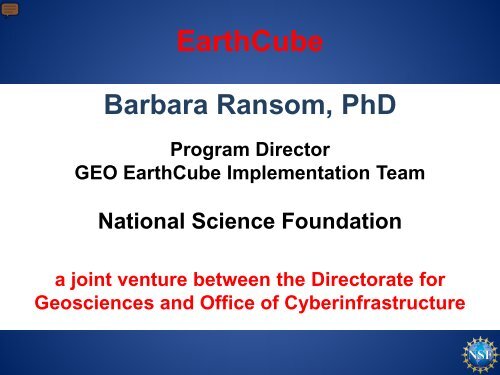Why EarthCube? - Unidata
Why EarthCube? - Unidata Why EarthCube? - Unidata
EarthCube Barbara Ransom, PhD Program Director GEO EarthCube Implementation Team National Science Foundation a joint venture between the Directorate for Geosciences and Office of Cyberinfrastructure
- Page 2 and 3: Big Questions, Big Problems contine
- Page 4 and 5: Read It and Weep The 15% spend an i
- Page 6 and 7: What Is EarthCube? Water: Changing
- Page 8 and 9: Path to the Vision An alternative a
- Page 10: Science Senarios Needed! • 2-3 se
<strong>EarthCube</strong><br />
Barbara Ransom, PhD<br />
Program Director<br />
GEO <strong>EarthCube</strong> Implementation Team<br />
National Science Foundation<br />
a joint venture between the Directorate for<br />
Geosciences and Office of Cyberinfrastructure
Big Questions, Big Problems<br />
continental evolution &<br />
changes thru time
Community: Cyber/Model Sophistication Index<br />
Age of Enlightenment<br />
Computer/Cyberinfrastructure Communities<br />
The 15%<br />
Modern Age<br />
Industrial Age<br />
Atmospheric and Climate Modeling<br />
Communities<br />
Seismology/Earthquake and<br />
Physical Oceanography Communities<br />
The 85%<br />
Bronze Age<br />
Nearly all other Geoscience groups<br />
Present Relative State of Cyber-Sophistication and Knowledge<br />
in the Geosciences
Read It and Weep<br />
The 15% spend an increasing amount of time having problems<br />
wrestling with unmanageably large data arrays, complex models,<br />
and problems scaling from global to regional or local scales<br />
The 85% spend about 80% of their time looking for, collecting, and<br />
getting the necessary data together in a format they can use and<br />
about 20% of their time actually thinking/doing science<br />
Both groups are not well integrated with one another and<br />
integration is needed to solve the complex, inter-related, and<br />
pressing environmental problems we and Earth are facing, with<br />
seriously heterogeneous data linking more homogeneous large<br />
data arrays
<strong>Why</strong> <strong>EarthCube</strong>?<br />
• Nature does not recognize separate disciplines.<br />
• <strong>EarthCube</strong> will democratize access to data.<br />
• <strong>EarthCube</strong> will increase research time by reducing<br />
time needed to find, access, and analyze data.<br />
• <strong>EarthCube</strong> will enable more interdisciplinary research<br />
and the pursuit of new questions.<br />
• <strong>EarthCube</strong> will accelerate the pace of discovery.<br />
• <strong>EarthCube</strong> will give all scientists the same chance of<br />
making major contributions regardless of institution<br />
size or institutional endowment.
What Is <strong>EarthCube</strong>?<br />
Water:<br />
Changing<br />
Perspectives<br />
Dynamic<br />
Earth<br />
Geosphere-<br />
Biospheric<br />
Connection<br />
Changing<br />
Climate<br />
Earth &<br />
Life<br />
• Transform the conduct of<br />
data-enabled geosciencerelated<br />
research.<br />
• Create effective<br />
community-driven<br />
cyberinfrastructure.<br />
• Allow global data<br />
discovery and knowledge<br />
management.<br />
• Achieve interoperability<br />
and data integration<br />
across disciplines.
NCAR<br />
Paleo-<br />
Climate<br />
Bioinformatics<br />
Biology<br />
Climate &<br />
Large Scale<br />
Dynamics<br />
Atmospheric<br />
Chemistry<br />
Solar<br />
Terrestrial<br />
Meteorology<br />
Magnetospheric<br />
Physics<br />
Ecosystem<br />
s<br />
Aeronomy<br />
Software<br />
&<br />
Modeling<br />
Geodesy<br />
Space<br />
Weather<br />
High Perf<br />
Computing<br />
Semantics<br />
&<br />
Ontologies<br />
Solid and<br />
Aqueous<br />
Geochemistry<br />
<strong>EarthCube</strong> CI<br />
Structure<br />
&<br />
Tectonics<br />
Cryosphere<br />
& Ice<br />
Dynamics<br />
Geobiology<br />
& Paleoentology<br />
Critical<br />
Zone & Soil<br />
Science<br />
Biological<br />
Oceanography<br />
Algorithms<br />
& Data<br />
Mining<br />
Igneous<br />
Petrology<br />
& Volcanology<br />
Geophysics<br />
& Geodynamics<br />
Physical<br />
Oceanography<br />
Geo Ed &<br />
Workforce<br />
Training<br />
Hydrology<br />
Marine<br />
Geology<br />
Marine<br />
Geophysics<br />
Geomorphology<br />
Sedimentology<br />
&<br />
Stratigraphy<br />
Chemical<br />
Oceanography<br />
Ocean<br />
Education<br />
Ocean<br />
Drilling &<br />
Engineering
Path to the Vision<br />
An alternative approach<br />
to respond to daunting<br />
science and CI challenges<br />
OOI<br />
IRIS<br />
<strong>Unidata</strong><br />
IEDA<br />
CUASHI<br />
NCAR<br />
<strong>EarthCube</strong> is<br />
an outcome<br />
AND a process<br />
<strong>EarthCube</strong> will<br />
require NSF and<br />
broad<br />
community<br />
involvement;<br />
new ways of<br />
doing<br />
Important Features:<br />
• Builds off existing data/modeling systems/cyberinfrastructure investments<br />
• Provides tools/approaches that enhance data discovery, access, and<br />
integration<br />
• Addresses serious cyber needs in fields where individual data points and<br />
observations are important<br />
• Leverages investments across fields<br />
• Allows for more integrative and interdisciplinary science
Imagine:<br />
• A world without laptops and WiFi - 22 yrs ago<br />
• A world without cell phones – 20 yrs ago<br />
• A world without digital cameras - 11 yrs ago<br />
• A world without mobile GPS - 8 yrs ago<br />
• A world without iPhones - 5 yrs ago<br />
• A world without iPads – 2.5 yrs ago<br />
Think of how much you depend on these tools!<br />
Imagine:<br />
• What would your life/science be without them?<br />
• What the next advance will make possible!
Science Senarios Needed!<br />
• 2-3 sentences on the science goal.<br />
• 2-3 sentences on its importance.<br />
• Summary of info, models, and tools needed and if<br />
they are all presently available and easy to use.<br />
• Summary of expected results/deliverables<br />
(conclutions, models, derived/raw data products, etc.)<br />
• A graphic of project workflow, potential data product.<br />
• Person/group creating the scenario, institution,<br />
contact information (email).



